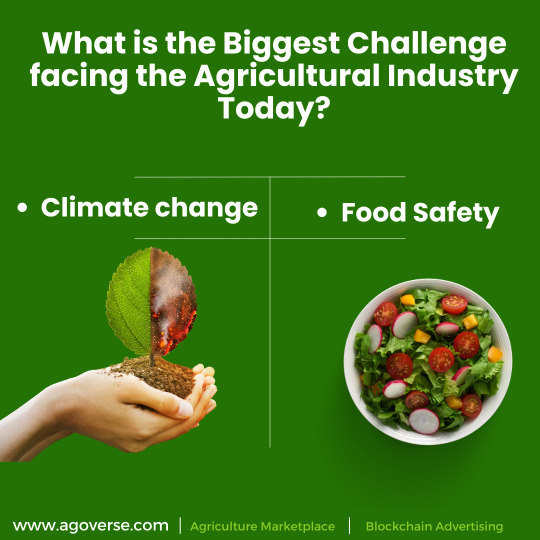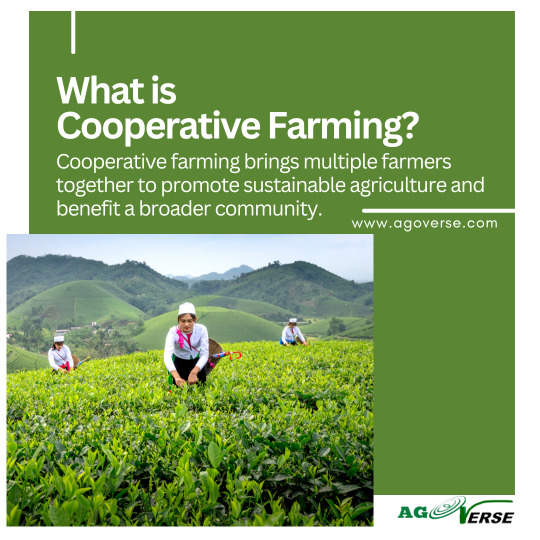Agoverse, the game-changing platform that empowers farmers to transform agriculture. Join us as we revolutionize the way farming is perceived and connect farmers with buyers worldwide. Create your storefront, showcase your products, and expand your reach with Agoverse. Witness the visionary journey of farmers and be a part of the agricultural revolution. Get ready to shape the future of farming with Agoverse!
Don't wanna be here? Send us removal request.
Text
Agriculture drones are revolutionizing the industry, ▪Allowing farmers to map fields, ▪Monitor crop health, ▪Apply Pesticides with Precision.
#agoverse#supplychain#agriculture#transparency#globalmarkets#blockchainagriculture#BlockchainInnovation#sustainablefood#drone#droneinagriculture#crophealth#pesticides#AgricultureDrones#FarmingRevolution#StreamliningOperations
1 note
·
View note
Text
Agoverse is a blockchain-based platform that connects farmers with buyers worldwide.
A secure and transparent marketplace for selling products
Access to financial resources through our Agolend lending platform
Real-time data and insights to help farmers make informed decisions
A community of farmers and experts who can share knowledge and support each other
Agoverse is also revolutionizing how farmers and vendors connect with their target audience. Our patent-pending blockchain advertising system allows farmers to reach their target audience with targeted ads that are more effective and efficient.
Join the Agoverse community today and start empowering agriculture through blockchain!
https://agoverse.com/
#FarmersUnite#BlockchainAgriculture#supplychain#agriculture#transparency#sustainablefood#foodtraceability#BlockchainInnovation#Global#globalmarkets#globalnetworkingevent#consumer
1 note
·
View note
Text

Our blockchain Agricultural Marketplace the interests of farmers, offering them direct access to buyers, fair prices, and market exposure.
Join the Agoverse today.
https://agoverse.com/auth/signup
#FarmersUnite#BlockchainAgriculture#supplychain#agriculture#transparency#sustainablefood#foodtraceability#BlockchainInnovation#Global#globalmarkets#globalnetworkingevent#consumer
1 note
·
View note
Text
Why are industries adopting smart contracts on blockchain?
In recent years, blockchain technology has garnered significant attention across industries for its potential to revolutionise traditional processes. One key aspect driving this disruption is the emergence of smart contracts. Smart contracts, powered by blockchain, offer a new level of efficiency, transparency, and security that has captured the interest of various sectors. In this blog, we will explore why industries are increasingly turning to smart contracts on a blockchain and the benefits they bring to businesses.
Enhanced Efficiency: Smart Contracts automate and streamline complex business processes, eliminating the need for intermediaries and manual paperwork. By leveraging blockchain's decentralized and distributed nature, smart contracts enable the execution of agreements with increased speed and efficiency. Industries such as supply chain management, logistics, and finance have experienced significant improvements in operational efficiency through the implementation of smart contracts.
Transparency and Security: Traditional contractual agreements often lack transparency, making it difficult to verify the authenticity and integrity of transactions. Smart contracts on a blockchain provide an immutable and transparent record of every transaction, ensuring trust and accountability. This transparency reduces fraud risks, enhances auditability, and improves compliance with regulatory requirements. Industries like real estate, healthcare, and legal services can benefit greatly from the increased transparency and security offered by smart contracts.
Cost Reduction: Smart contracts eliminate the need for intermediaries, reducing costs associated with third-party services, paperwork, and manual processing. With smart contracts, businesses can streamline operations, reduce administrative overhead, and minimize the risk of errors or disputes. This cost reduction is particularly appealing to industries such as insurance, financial services, and supply chain management, where numerous intermediaries are involved in transactions.
Elimination of Disputes: Traditional contracts are prone to disputes and often require legal intervention to resolve conflicts. Smart contracts, with their self-executing and self-enforcing capabilities, significantly reduce the likelihood of disputes. By encoding predefined rules and conditions directly into the contract's code, smart contracts ensure that all parties adhere to the agreed-upon terms. This feature is particularly beneficial in industries such as supply chain management, where multiple parties are involved in complex transactions.
Improved Traceability: Blockchain-powered smart contracts provide an immutable and auditable trail of transactions. This traceability enables industries to track and verify the origin, authenticity, and movement of goods or assets throughout the supply chain. With smart contracts, industries like food and pharmaceuticals can enhance traceability, mitigate counterfeiting risks, and ensure compliance with quality standards and regulations.
Expanding Possibilities: Smart contracts unlock new possibilities for innovative business models and decentralized applications . Industries are exploring the potential of blockchain-enabled smart contracts for crowdfunding, decentralized finance, decentralized autonomous organizations, and more. These applications provide opportunities for greater financial inclusion, peer-to-peer transactions, and democratized decision-making, disrupting traditional centralized systems.
Conclusion:
The adoption of smart contracts on a blockchain is gaining momentum across industries, driven by the desire for increased efficiency, transparency, security, and cost savings. As businesses realize the potential of blockchain technology, they are harnessing the power of smart contracts to automate processes, enhance trust, and unlock new opportunities for innovation. Whether it's supply chain management, finance, real estate, or any other sector, smart contracts have the potential to revolutionize the way business is conducted, paving the way for a decentralized and more efficient future.
#farming#agoverse#blockchain#sustainableagriculture#futurefarming#blockchaintechnology#organicfarming#climatechange#bitcoin#blockchainfarmers#smart contracts
1 note
·
View note
Text

Attention Farmers
Ready to revolutionize your agricultural journey? Join our blockchain-powered Agricultural Marketplace and unlock a world of opportunities. 🌍 Showcase your exceptional produce, share your inspiring farming stories, and connect with a global community of passionate consumers. Let's grow together! sign up: https://agoverse.com/auth/signup
#FarmersUnite #BlockchainAgriculture #supplychain #agriculture #transparency #sustainablefood #foodtraceability #BlockchainInnovation #Global #globalmarkets #globalnetworkingevent #consumer
1 note
·
View note
Text

🌾📊 POLL TIME! 📊🌾 We want to hear from you! What do you think are the greatest challenges confronting the agricultural industry today? Cast your vote and share your insights on the key issues impacting farming and food production. 🚜🌿💪
#AgricultureChallenges#FarmingIssues#HaveYourSay#VoteNow#VoteThemOut#vote#poll#climate#food#climatechange#foodsafetytips#smartagrimarket#blockchainfarmers#agritechrevolution#farmersonblockchain#BlockchainAgriMarketplace
0 notes
Text

A smart contract is a self-executing contract written in code and deployed on a blockchain platform. It automates contract terms and conditions, executes actions based on predefined conditions, and operates without the need for intermediaries. Smart contracts are transparent, and secure, and can be used in various applications beyond financial transactions.
0 notes
Text

Agoverse | Showcase your Product Directly to the Customer Agoverse is the most trusted platform for selling #agriculturalproducts. Our secure #blockchain technology ensures that your transactions are safe and secure, and our customer support team is always available to help you. Just By creating an account, you can showcase your #farm product to the buyer or Farmer. There is no need to connect with an intermediary to sell your product. Directly Connect to farmers and Sell products at your price. Sign up today and start selling your products! https://agoverse.com/auth/signup #agoverse #agro #agriculture #agriculturalproducts #farming #farmer #farm #farmproducts #farmersmarket #futurefarming #blockchain #blockchaintechnology #blockchainsystem #virtualmarket #virtualmarket #newtrend #trending #news #viral #viralvideos
0 notes
Text
Blockchain in Agriculture and Food Supply Chain Market Forecast Suggests Sustained Growth Throughout the Forecast until 2029

The blockchain in Agriculture and food supply chain market is expected to grow at a CAGR of 43.76% from 2023 to 2029. This growth is being driven by a number of factors, including the increasing demand for food safety and traceability, the growing popularity of smart contracts, and the increasing adoption of blockchain by governments and businesses.
Blockchain is a distributed ledger technology that can be used to record transactions in a secure and transparent way. This makes it ideal for tracking food products from farm to fork, as it can help to ensure that they are safe and have been produced sustainably.
Smart contracts are self-executing contracts that are stored on the blockchain. These contracts can be used to automate payments and transactions in the food supply chain, which can help to reduce costs and improve efficiency.
Governments and businesses are increasingly recognizing the potential benefits of blockchain, and are starting to adopt it in their supply chains. For example, the United States Department of Agriculture (USDA) is currently working on a blockchain pilot program to track the movement of food through the supply chain.
The growth of the blockchain in agriculture and food supply chain market is expected to create new opportunities for businesses. These businesses will need to develop blockchain-based solutions that can help to improve food safety, traceability, and efficiency.
The following are some of the benefits of using blockchain in the agriculture and food supply chain:
Improved food safety: Blockchain can help to track food from farm to fork, which can help to ensure that it is safe and has been produced sustainably. This is because blockchain is a tamper-proof ledger that records all transactions in chronological order. This makes it very difficult to counterfeit or adulterate food products. Increased traceability: Blockchain can help to track the movement of food through the supply chain, which can help to improve traceability. This is important for both consumers and businesses, as it allows them to know exactly where their food comes from. Reduced costs: Blockchain can help to reduce costs in the food supply chain by automating payments and transactions. This is because smart contracts can be used to automate these processes, which can save time and money. Improved efficiency: Blockchain can help to improve efficiency in the food supply chain by streamlining processes and reducing paperwork. This can help to speed up the movement of food through the supply chain, which can lead to increased profits. Overall, the blockchain in agriculture and food supply chain market is a promising market with a lot of potential. As the market matures, we can expect to see even more innovative applications of blockchain in this sector.
Here are some of the challenges that the blockchain in agriculture and food supply chain market faces:
The lack of standardization: There is currently no single standard for blockchain in the agriculture and food supply chain market. This can make it difficult for businesses to adopt blockchain and for different systems to interoperate. The lack of trust: Some businesses and consumers may be hesitant to adopt blockchain because they do not trust the technology. This is because blockchain is a relatively new technology, and there is still some uncertainty about how it will be used in the future. The high cost: The cost of developing and deploying blockchain solutions can be high. This can be a barrier for some businesses, especially small businesses.
Despite these challenges, the blockchain in agriculture and food supply chain market is expected to grow significantly in the coming years. The market is expected to be driven by the increasing demand for food safety and traceability, the growing popularity of smart contracts, and the increasing adoption of blockchain by governments and businesses.
#farming#blockchain#agriculture#agoverse#organicfarming#sustainableagriculture#signup#blockchaintechnology#futurefarming#sustainable#news#trendingpost#usa#USA
3 notes
·
View notes
Text

Blockchain technology enables the tracking of the food supply chain from farm to plate by creating a transparent and immutable record of transactions and ownership transfers. Participants in the chain have unique digital identities, and smart contracts automate and enforce transaction terms. Each time a food product changes hands, a transaction is recorded on the blockchain, capturing details like origin, quality, and timestamps. The ledger is tamper-proof, ensuring data integrity and transparency. Access control and privacy settings allow for different levels of information sharing. Integration with other technologies like IoT enhances traceability. Implementing blockchain in the food supply chain builds trust, reduces fraud, ensures food safety, and facilitates efficient responses to quality issues or recalls. . . . . . . . . . . #BlockchainTechnology #SupplyChain #FoodTraceability #FarmToTable #FoodSafety #Transparency #DataIntegrity #SmartContracts #FoodSecurity #SustainableFood #DigitalIdentity #IoT #BlockchainInnovation #FoodTech #TrustAndVerification
0 notes
Text

🤔What Would you Prefer? Offline Shopping Or Online Shopping 👇Comment Below
#onlineshopping#OfflineShopping#SignUp#facts#shopping#agoverse#agriculture#agriculturalindustry#agriculturelife#comment#LikeAndShare#trends#trendingpost
0 notes
Text
America's Agriculture Industry Can Potentially Save $1 Billion Annually Through Energy Efficiency in Key Operational Areas
Sign up Now https://agoverse.com/auth/signup

#SignUp#agopay#agolend#agoverse#sustainableagriculture#sustainable#futurefarming#organicfarming#blockchaintechnology#facts#BREAKING#newsletter#america#agriculturalindustry
1 note
·
View note
Text
Agoverse - Amazon of Agriculture
Grow Your Agricultural Empire Virtually with Our Revolutionary Farming Platform!
Join Now: https://agoverse.com/auth/signup

#agoverse#farming#blockchain#farmers#cooperativefarming#sustainable#sustainableagriculture#FarmersMarket#SignUp#futurefarming#blockchaintechnology#organicfarming#regenerativefarming#naturalfarming#signup#agopay#agolend#Join
1 note
·
View note
Text

The blockchain in agriculture market is projected to reach USD 2760.85 million by 2032. Blockchain technology offers transparency, traceability, and efficiency in agricultural supply chains, improving trust, reducing fraud, and ensuring food safety. Factors driving adoption include demand for food traceability, supply chain management, and sustainability. Governments and regulatory bodies support blockchain adoption. Market projections are subject to uncertainties.
1 note
·
View note
Text

Blockchain technology revolutionizes agriculture by enhancing food safety, transparency, and sustainability. It enables traceability and secure data management across the supply chain. Integrating IoT and machine learning, blockchain facilitates intelligent farming, improving efficiency and reliability. It also establishes trust between producers and consumers, ensuring transparency and verifiable information about food origin. Blockchain-powered index-based insurance mitigates climate risks for farmers. Additionally, it streamlines transactions, providing secure authentication and digital payment solutions. While challenges exist, blockchain offers significant benefits, including transparency, security, efficiency, and customer engagement. It transforms agriculture by promoting trust, reducing costs, and enhancing sustainability.
0 notes
Text

What is Cooperative Farming?
Cooperative farming brings multiple farmers together to promote sustainable agriculture and benefit a broader community.
Signup Now: https://agoverse.com/auth/signup
#agoverse#farming#blockchain#farmers#cooperativefarming#sustainable#sustainableagriculture#FarmersMarket#SignUp#futurefarming#blockchaintechnology#organicfarming#regenerativefarming#naturalfarming
0 notes
Text
https://agoverse.com/
Agoverse is providing agriculture products in metaverse
0 notes